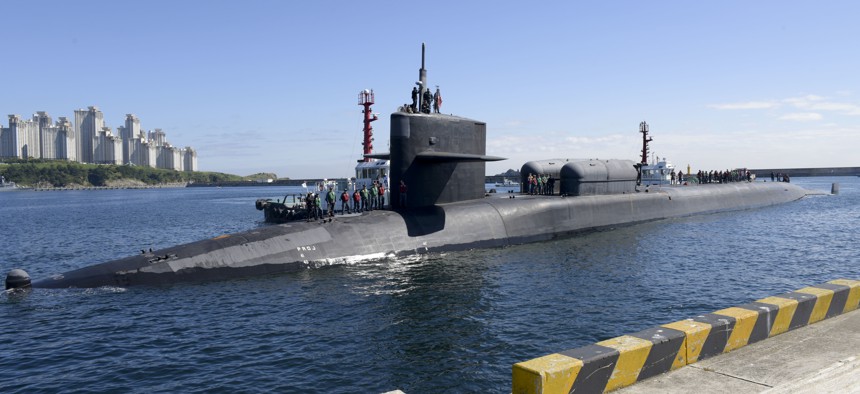
The Ohio-class guided-missile submarine USS Michigan (SSGN 727) (Gold) pulls into the pier of Republic of Korea's Busan Naval Base as part of a routine port visit. Mass Communication Specialist Seaman William Carlisle/Navy
‘Redo’ Nuclear Posture Review, Says Next House Armed Services Chair
Rep. Adam Smith laid out new terms for a debate over the Pentagon’s plans to expand the military’s nuclear arsenal.
The incoming chairman of the House Armed Services Committee is taking aim at the Trump Administration’s plans to expand America’s nuclear arsenal.
While Democrats will only control one chamber of Congress for the next two years, Rep. Adam Smith, D-Wash., called to “totally redo the Nuclear Posture Review,” the administration’s blueprint for replacing Cold War-era nuclear weapons with newer ones envisioned to be around for a half century. Experts say these efforts could together cost more than $1 trillion.
“We cannot afford what they are talking about,” Smith said Wednesday at a Ploughshares Fund conference in Washington. “When you look at the needs we have in national security, the needs we have in the country and the $22 trillion debt, what they’re talking about in terms of totally rebuilding a nuclear weapons capacity in all pieces of the triad is way beyond what we can afford.”
The Pentagon — beginning during the Obama administration — began doling out billions of dollars in contracts for new stealth bombers, submarines, intercontinental ballistic missiles and nuclear cruise missiles, the three pieces of the so-called nuclear triad.
“I don’t think we have a clear policy right on nuclear weapons that puts us on the right path,” Smith said.
Among the most controversial parts of Trump’s Nuclear Posture Review: Modifying submarine-launched ballistic missiles so they would have a lower yield. Pentagon officials say this would help counter Russia’s similar low-yield nuclear weapons.
“We will have that capability in direct response to Russia,” Vice Adm. Johnny Wolfe, director for the Navy’s strategic systems programs, said of the low-yield nuclear weapon on Nov. 8 at the Naval Submarine League Symposium in Arlington, Virginia.
“We along with [the National Nuclear Security Administration] have been funded to go do that program,” he said. “We will, very soon, deploy a small number of low-yield … weapons that will be a direct counter to what Russia believes they’ve got today that we do not have.”
Smith has long opposed the low-yield nuclear weapon.
“Fundamentally, what I’m hoping we can do going forward is sort of reset our policy on nuclear weapons and how we avoid nuclear war,” Smith said Wednesday.
“You don’t need to have thousands of them [weapons] as we do,” he said. “I think we need to fundamentally rebuild our nuclear strategy and to use it as a deterrent, not as this overwhelming force.”
Smith’s view is in stark contrast to the broad-ranging nuclear upgrade initiatives started under Obama and increased under Trump. At last week’s Naval Submarine League conference, admirals talked about the needs to build new submarine-launched nuclear missiles that would be in the military’s arsenal until the year 2084.
“As we continue to deploy those [new Columbia-class submarines] we’re going to physically run out of Trident D5 missiles,” Wolfe said.
The Navy will begin “trade studies” in 2020 “to determine what does that next D5 look like,” the admiral said.
“We have to go build more missiles to be able to continue to support the Columbia after her initial load out,” he said.
Rear Adm. John Tammen, director of the undersea warfare division of office of the Chief of Naval Operations, said the same Submarine League conference, called for restricting public access to information in budget documents.
“We have to stop telegraphing our budgets,” Tammen said. “I took a couple of slides out of my brief because I do think they provide a little too much telegraphing. We do need to maintain that edge and one way of doing that is not to tell the adversaries what we’re doing.”
The Trump administration officials said last month that the U.S. intends to withdraw from the Intermediate-range Nuclear Forces Treaty with Russia, which the U.S. says Moscow is violating.
“We need more multilateralism,” Smith said. “We should work with China and Russia to redo an INF treaty. We should certainly make sure that we maintain New Start.”
While Smith will have influence in his new seat as chairman of the Armed Services Committee, he acknowledged this major changes to nuclear policy are unlikely with Republicans controlling the Senate, and more importantly, the White House.
“We could pass whatever legislation we want to pass, executive power is enormous,” Smith said. “That’s why it matters so much who has that job.”







